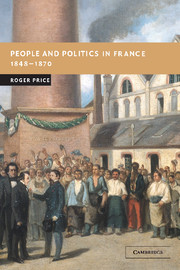Book contents
- Frontmatter
- Contents
- Acknowledgements
- List of abbreviations
- Introduction
- 1 Dominant classes: the social elites
- 2 Coming to terms with ‘democracy’
- 3 Aspiring social groups: the middle classes
- 4 Peasants and rural society: a dominated class?
- 5 Peasants and politics
- 6 The formation of a working class
- 7 The working-class challenge: socialisation and political choice
- Conclusion
- Select bibliography
- Index
7 - The working-class challenge: socialisation and political choice
Published online by Cambridge University Press: 28 August 2009
- Frontmatter
- Contents
- Acknowledgements
- List of abbreviations
- Introduction
- 1 Dominant classes: the social elites
- 2 Coming to terms with ‘democracy’
- 3 Aspiring social groups: the middle classes
- 4 Peasants and rural society: a dominated class?
- 5 Peasants and politics
- 6 The formation of a working class
- 7 The working-class challenge: socialisation and political choice
- Conclusion
- Select bibliography
- Index
Summary
AN EMERGING CLASS-CONSCIOUSNESS?
This chapter and its predecessor are organised around the assumption that working people's politics cannot be explained in isolation from other aspects of their lives. Furthermore, the findings of the previous chapter would appear to suggest that whilst cross-class relationships remained of fundamental importance to the development of a worker's social identity, changes in the workplace and the problems of everyday existence were increasingly given meaning by the development of a partially autonomous working-class culture. The primary focus of the individual worker's loyalties might shift between the family, workplace, trade, neighbourhood, class, or nation, according to the interplay between short-term circumstances and more or less established traditions, animosities, and aspirations. Nevertheless, a sense of class increasingly informed workers' self-perceptions.
In the workplace, resentment of exploitation – generally vague and unformulated – appears to have been widespread. The air of superiority displayed by the employer, the bourgeoisie, and the ‘rich’ in general was especially resented. According to the prefect at Rouen, workers particularly despised bosses who had risen from their ranks, but more generally ‘the industrialist, in his view, is no longer a chief who gives him work and a livelihood; he is a master who exploits him’. Wage earning was widely regarded as simply a form of ‘servitude’. Thus, M. Bacot, a speaker at a public meeting in Belleville on 4 February 1869 divided society into three ‘castes’ – ‘the bourgeoisie, its valet and the supplicants’.
- Type
- Chapter
- Information
- People and Politics in France, 1848–1870 , pp. 357 - 428Publisher: Cambridge University PressPrint publication year: 2004



